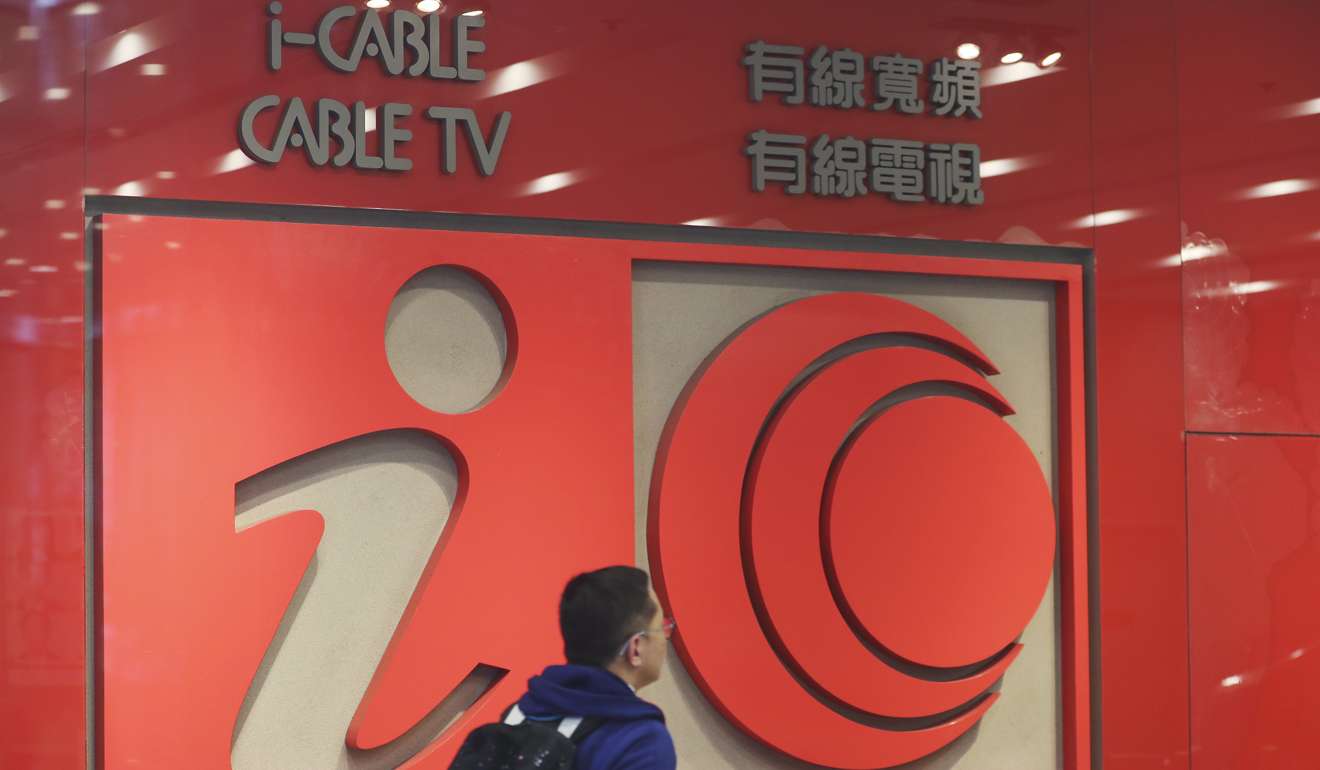
Analysis | Size does matter: Hong Kong’s TV industry pays the price for small market
Pay-TV operators i-Cable and Now TV, and the city’s free-to-air broadcasters like TVB and new entrant Viu TV, face rising competition from online content distributors
Television broadcasting, like most media and entertainment businesses, is no easy industry to play in – even more so in Hong Kong.
That is the latest assessment from Richard Li Tzar-kai, chairman of telecommunications giant PCCW, which owns both pay-TV and free-to-air TV businesses in the city.
“Cash flows from our pay-TV business, Now TV, will help develop our free-TV business, Viu TV,” he told PCCW’s annual general shareholders’ meeting on Friday. “We do not expect Viu TV to be profitable in the next two to three years, but it will be a good [content distribution] platform for us.”
PCCW plans to plough HK$350 million into Viu TV, whose operating costs have been lowered by savings from economies of scale and resource-sharing from its pay-TV business.

Although Now TV is the pay-TV market leader in Hong Kong, it suffered a decline in profitability last year, with earnings before interest, tax, depreciation and amortisation falling 15.9 per cent to HK$413 million.
Now TV’s best year was 2011 when it reported ebitda of HK$631 million. No net profit figure was disclosed.
To fend off competition from online content distributors, which have been taking audiences away from traditional pay-TV or free-TV services, PCCW launched a so-called over-the-top service with content distributed over internet-enabled devices.

The hefty losses endured by the nascent free-TV and over-the-top operations during their start-up phases literally wiped off all the operating profit that PCCW’s bread-and-butter pay-TV business earned last year.
PCCW’s loss-making foray into the online content distribution business and last week’s announcement by property major Wharf (Holdings) that it would halt further investment into its pay-TV business speak volumes about Hong Kong’s small and crowded television market.
Operators have little room to expand into mainland China due to regulatory barriers amid rising competition from online content providers empowered by advances in internet technology.
Wharf said it would not provide more financing to i-Cable for its pay-TV and broadband internet operations beyond a HK$400 million facility committed to in December 2016.
Cash flows from our pay-TV business, Now TV, will help develop our free-TV business, Viu TV
“The pay-TV business in Hong Kong can hardly be considered lucrative since its debut in Hong Kong many years ago,” DBS Vickers analyst Tam Tsz-wang said. “This can be blamed on the city’s small market size and the lack of a new and better operating model.”
I-Cable, the city’s oldest pay-TV broadcaster, has invested HK$4.6 billion in fixed assets like network equipment and TV facilities over the past 16 years, according to its earnings results filed during the period.
Five months ago, Wharf signed a deal to sell its fixed-line telecommunications business, which was often marketed as a bundle with i-Cable’s pay-TV and broadband services.
Last week, it said it failed to find a buyer for i-Cable.

Even if depreciation – the cost of fixed assets such as broadcasting equipment and offices – were not taken into account, the company still lost money in three of the past five years.
Revenue rose steadily from HK$1.3 billion in 1999 to a peak of HK$2.5 billion in 2006 before declining to HK$1.4 billion last year.
Its subscriber numbers fell from 1.09 million in 2012 to 930,000 last year while those of rival Now TV grew from 1.18 million to 1.32 million.
“I-Cable [has been facing] fierce competition from Now TV,” Teoh Kia Ling, a Malaysia-based advertising and TV programming analyst at industry information provider IHS Markit, told the South China Morning Post. “With financial backing from PCCW, Now TV is leading the pay-TV market with compelling live sport content including Premier League, La Liga and Bundesliga.”
Even so, the market leader complained its ebitda tumbled 15.9 per cent last year “due to higher content costs bid up by irrational competition and higher publicity and marketing spending to attract and retain customers”.
To renew its pay-TV licence for 12 more years after the expiry of the current one on May 31, i-Cable, the No 2 player, would have to deliver on its capital expenditure commitment to the government of HK$251 million and programming investment of HK$3.2 billion until 2023.
I-Cable’s net debt-to-shareholders’ equity stood at 96 per cent at the end of last year, up from 27 per cent a year earlier, as borrowings nearly doubled while its equity shrank due to last year’s steep loss.
Wharf last week decided enough was enough and pulled the plug on further support for i-Cable.
However, i-Cable still plans to launch its Fantastic TV free-to-air service in May, though it remains to be seen how much investment will be ploughed into the channel in order for it to compete effectively with more established rivals for advertising revenue.

I-Cable’s programming library was valued at HK$169 million at the end of last year, according to its latest results filing.
By contrast, Hong Kong’s dominant free-to-air player Television Broadcasts’ had HK$777 million worth of rights for content and films produced but not yet broadcast on its books at the end of June 2016.
It did not book a value for content that was already broadcast and archived, which a spokesman said consisted of 143,000 hours of news, public affairs programmes, drama and variety shows.
The average production cost for a drama programme was about HK$1 million per hour, he added.
According to ATV’s provisional liquidators, its assets were worth HK$27 million to HK$40 million at the end of October last year in the event of liquidation.

Its most valuable asset is its headquarters in Tai Po, which had a net book value of HK$367 million, although it would be reduced to a “surrender value” of just HK$4.8 million if government-owned Hong Kong Science and Technology Parks exercised its right of re-entry.
Tam said the valuations of TVB’s and ATV’s content archives were hard to assess, given that their value could be drastically different from companies with different business plans to monetise them.

Another drawcard of being in the media and entertainment industry was that it gave would-be investors the benefit of free publicity for their other business interests as well as influence on society in Hong Kong and beyond, he noted.
“But the size, depth and historical value of video archives is one thing. Facilities, human resources and price are also factors deciding whether deals get done,” Lai said.
Lai noted the TV and media industry was a tough sell, given the proliferation of low-cost or free online content.
Pay-TV operators i-Cable and Now TV, and Hong Kong’s free-to-air broadcasters like TVB and new entrant PCCW’s Viu TV, face rising competition from online content providers.
They include Netflix and LeEco, which stream video content over the internet through over-the-top services – often at lower prices.
Viu TV took over broadcasting spectrum vacated by ATV, the world’s first Chinese-language TV broadcaster with 59 years of operating history that went off-air in April last year due to a lack of funding after many years of losses.
“The whole pay-TV business is under great pressure due to rampant online piracy and proliferation of over-the-top broadcasting services,” TVB spokesman Tam Sik-yeung said.
In January, the broadcaster’s pay-TV unit, TVB Network Vision, informed the Hong Kong government of its decision to surrender its pay-TV licence.
The unit has lost about HK$2.2 billion since it was launched in February 2004.
The licence still has eight years to go, and its forfeiture needs approval by the government.
“The pay-TV business is not commercially viable in a small market like Hong Kong,” Tam said.
The pay TV business is not commercially viable in a small market like Hong Kong
To combat piracy and competition from online entertainment alternatives, TVB launched in April 2016 its own over-the-top service called myTV Super, which it said provided content “on any device, anytime, anywhere” both through mobile devices and set-top boxes.
It had signed up two million subscribers by early December last year, double from mid-October and much higher than the 1.4-million target it set for November this year when it will celebrate its 50th anniversary.

Tam praised TVB’s over-the-top service, which provides subscribers with access to more than 11,000 hours of programmes from its library and current offerings.
“It has strengthened TVB’s competitive position against rivals that use online platforms to distribute television content and put up a fairly high entry barrier for potential entrants,” Tam said.
“The biggest challenge facing players in Hong Kong is the small market, which means high cost for content acquisition, whereas TVB is the biggest content producer in the domestic market and can supplement it with some purchases of foreign content.”
TVB’s success in the over-the-top business provided a positive spin to its otherwise gloomy profit warning issued three months ago, in which it said it expected to post a 55 to 65 per cent fall in net profit for last year from HK$1.3 billion in 2015.
TVB cited weak advertising revenue, HK$150 million of losses from last year’s Olympic Games broadcast, start-up losses for its new online content provision service and lower asset disposal gains.
The estimated start-up losses narrowed to about HK$50 million from the HK$100 million expected earlier, thanks to a better-than-expected subscriber sign-up rate.
TVB highlighted the “relatively fixed cost structure” of the content production business, which cannot easily be reduced during the current business downturn.
In 2016, the city’s retail sales fell 8 per cent year on year, the biggest drop in consumer spending since 1999, government figures showed. This followed a 3.7 per cent fall in 2015.
Hong Kong’s advertising market last year shrank 13 per cent to HK$39.8 billion, the biggest fall since 1999, according to media-monitoring firm admanGo.
While TV advertising accounted for the largest share at 30 per cent, they joined other traditional media such as paid newspapers, magazines, radio and outdoor displays in seeing declines, while ads on online and mobile platforms grew.
Additional reporting by Peggy Sito



